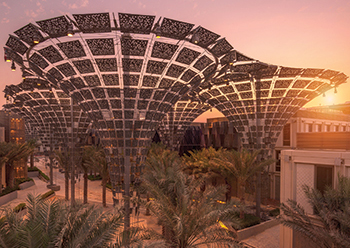Delay sought for big show
While all Expo-led construction has been completed and the 192 participating countries are working on getting their pavilions ready for Expo 2020 Dubai, the possibility of a one-year delay to the opening of the world’s greatest show was being considered due to the Covid-19 outbreak, at the time of going to press.
01 April 2020
As work continues at a steady pace on the various Expo 2020 Dubai projects, concerns regarding the coronavirus outbreak has prompted the organisers to consider rescheduling the six-month-long world-class event which was due to open on October 20, 2020.
The Steering Committee of Expo 2020 Dubai has collectively agreed to explore with the Bureau International des Expositions (BIE), the World Expo governing body, the possibility of a one-year delay to the opening of Expo 2020. The BIE will now work with its member states and Expo 2020 Dubai organisers to establish a change in dates. A final decision on postponement can only be made by the BIE’s Executive Committee and the General Assembly and a change of dates requires a two-thirds majority vote from the member states of the organisation.
Elaborating on the decision, Reem Al Hashimy, UAE Minister of State for International Cooperation and Director General, Expo 2020 Dubai, says: “The global situation is fast moving, and remains unpredictable. Over the last several weeks, we have been consulting with key UAE and international stakeholders to review the ongoing impact of Covid-19 on our plans and preparations for Expo 2020 Dubai.
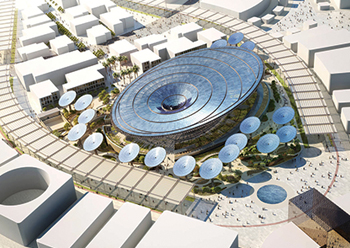 |
|
The sustainability pavilion ... designed to be a net zero energy building. |
“While they remain firmly committed to Expo 2020, many countries have been significantly impacted by Covid-19 and they have, therefore, expressed a need to postpone the opening of Expo 2020 Dubai by one year, to enable them to overcome this challenge. The UAE and Expo 2020 Dubai have listened. And in the spirit of solidarity and unity, we supported the proposal to explore a one-year postponement at the Steering Committee meeting. We look forward to welcoming the world, which we are certain will only come out of this pressing challenge stronger, and more resilient than it ever was.”
“We will follow due BIE processes on making the decision to delay Expo 2020. We remain firm in our collective commitment to deliver an Expo that’s true to its time and to our shared, urgent priorities. We believe that in light of this global challenge, humanity needs to come together to remember what unites us. That remains the collective ambition of all those involved in this Expo,” she adds.
Participating countries briefed the Steering Committee on the global precautionary measures that have to be taken to ensure the health and safety of all those involved in the preparation of this mega event.
Expo 2020 organisers have reaffirmed the UAE’s commitment to working hand in hand with its international partners to deliver a World Expo which holds true to its founding purpose: providing an inclusive global platform to address shared challenges, and seek solutions in the spirit of international cooperation and global solidarity.
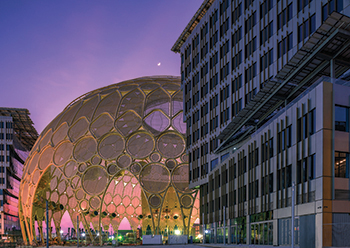 |
|
Al Wasl Plaza ... inaugurated in January. |
Dimitri S Kerkentzes, Secretary General of the BIE, says: “The world is facing extraordinary and unprecedented circumstances and we all expect the challenges to continue in the months to come. Today’s agreement by the organiser and the members of Expo 2020 Dubai’s Steering Committee to explore options for a one-year delay to the opening of the World Expo is welcome. In the spirit and in accordance with the Paris Convention of 1928, any decision on the World Expo needs to be collaborative, and agreed upon collectively in a vote of the countries that form the BIE. We will move forward in supervising the process to follow in accordance with the rules and regulations of the BIE convention.”
A total of 192 countries are participating at Expo 2020 Dubai, the first World Expo and largest event ever to be held in the Arab world. All these participating countries will have their own pavilion for the first time in the 169-year history of the Expos. The show, held every five years, puts the spotlight on human brilliance and achievement and the theme for the Dubai event this year is ‘Connecting Minds, Creating the Future’.
According to the organisers’ construction update in February, the project had achieved 168 million working hours and has some 41,000 people working on site. Remarkable progress has been made on the ambitious plan to transform the 4.38-sq-km desert site, particularly over the past year. Approximately 2 sq km of this area will form the Expo gated area featuring the thematic districts, while the remaining 2.4 sq km will feature supporting amenities and facilities, including the Expo 2020 Village for participant and staff accommodation, warehousing, logistics, transport nodes, hotels, retail and a public park.
Several construction projects have been developed under the three sub-themes – Opportunity, Sustainability and Mobility – of the event. Major milestones have also been achieved along the way, the latest having been the installation of the three giant portals in February that will usher in 150,000 visitors a day on average or 25 million visits over six months of the show.
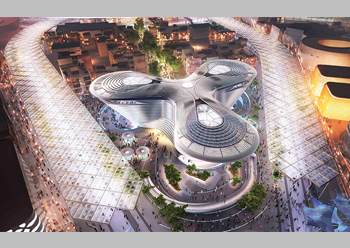 |
|
Mobility Pavilion ... designed by the UK-based Foster + Partners. |
Conceived by Expo 2020 in collaboration with top British architect Asif Khan and his studio, the portals are a futuristic adaptation of the traditional mashrabiya, an intricate design used across the region to regulate light and airflow. The 21-m-high and 30-m-long portals are woven entirely from strands of ultra-lightweight carbon-fibre composite that lend incredible structural strength. Each portal features two vast doors that will be opened every morning of the 173 days of Expo 2020 in a symbolic act of welcoming the world.
Earlier, at the end of January, HH Sheikh Mohammed bin Rashid Al Maktoum, Vice President, Prime Minister and Ruler of Dubai, and HH Sheikh Mohamed bin Zayed Al Nahyan, Crown Prince of Abu Dhabi and Deputy Supreme Commander of the UAE Armed Forces, inaugurated the iconic Al Wasl Plaza, the heart of the Expo 2020 Dubai site. Named after the Arabic word for ‘connection’, this centrepiece of Expo 2020 will host major ceremonies and celebrations, and the venue’s steel trellis dome will act as an immersive 360-degree projection surface that can be viewed from both inside and outside. The dome, which reaches a height of 67.5 m and has a diameter of 130 m, covers an area the size of 16 tennis courts and weighs as much as 500 elephants.
In May last year, the construction of the three petal-shaped thematic districts was completed. These districts will feature the 192 country pavilions, showcasing unique architecture, culture and exhibits from around the world. Designed by Hopkins and Partners, the thematic districts evoke old Dubai, with facades resembling traditional Emirati wind towers and walkways lined with flora indigenous to the UAE. Built by the UAE’s Al Futtaim Construction, these thematic districts have been landscaped with water and shading features. They form the largest built-up area of the site and include 86 low-rise buildings. Each district will be anchored by its own thematic pavilion and connected to the central Al Wasl Plaza.
All Expo 2020-built structures are designed to achieve at least Leed (Leadership in Energy and Environmental Design) Gold certification, the globally recognised standard of sustainable architecture.
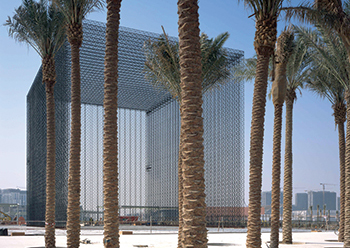 |
|
The 21-m-high and 30-m-long portals ... woven from strands of ultra-lightweight carbon-fibre composite. |
Terra, the sustainability pavilion for example, covers 25,000 sq m, has 6,300 sq m of exhibition space and has been designed to be a net zero energy and net zero water building. The pavilion has more than 1,050 solar panels arranged on its 130-m-wide canopy and on the locally-designed energy trees (e-trees) that dot the landscape and rotate to face the sun like sunflowers. These can produce four gigawatt hours (GWh) of electricity per year and have the capacity to charge 890,000 mobile phones, according to the organisers.
Expo 2020 will have its own dedicated Dubai Metro station on the Route 2020 line, with carriages capable of transporting 44,000 passengers per hour to and from the site
The Dubai Metro Route 2020 extension, which will link Expo 2020 to the rest of the emirate, the three Dewa substations that will power the 4.38-sq-km site and other key water, sewage and telecommunications infrastructure, including the 2.2-km road network, have already been completed.
More than 80 per cent of the Expo-built environment will live on after the event as part of the future District 2020, an integrated mixed-use community. It will comprise 65,000 sq m of residential space and 135,000 sq m of commercial space in a location that will be home to world-class innovation, educational, cultural and entertainment facilities.
- Delay sought for big show
- Throwing light on French innovation
- Germany celebrates topping out of pavilion
- US kicks off construction work on showcase
- Ireland to portray as ‘Island of Inspiration’
- Work in progress with health checks
- Siemens in deal to set up operation in District 2020
- RTA starts trial run of self-driving vehicles


